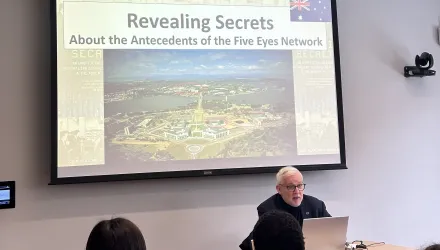As hard as it may be to imagine sometimes, what with the steady stream of bad news from Iraq and other global hotspots, the prospects for long-term global peace are greater today than they have been in the past 100 years.
There exists at this moment a brief window of opportunity — before any return of the kind of global polarization that in the past led to world wars — to secure enduring stability.
The historic model is the European Concert of Nations of the 19th century. The Concert, which included Britain, France, Russia, Prussia and Austria, was created in the wake of the Napoleonic Wars and focused on preventing a new war in Europe.
As a form of international diplomacy, it succeeded as long as the major states agreed on internal politics designed to keep aristocratic governments in power.
Essentially, after the Napoleonic Wars, the European nations resolved to maintain peace, prevent revolution and keep French power within bounds. Russia and Great Britain were the eastern and western mainstays of that combination, restraining France, Turkey and Egypt from toppling the balance.
Their resolve to prevent a new European war made possible agreements in 1831–32 over Belgium, and 1839–41 over Egypt and Turkey.
France was not allowed to expand, but Paris was not humbled. The Concert made sure that France accepted the outcomes and remained peaceful.
It worked so long as revolution did not partition the continent into liberal and conservative wings. It began to break down when the French revolution of 1848 broke out and spread to the rest of Europe. Britain accepted reform but Russia opposed it, causing an irreparable tear.
The Concert came to its final demise with the advent of World War I.
Today a new Great Power Concert is possible involving the United States, the European Union, Russia, China, Japan and India.
The eastern and western mainstays of co-operation are the U.S. and Europe on one side, and China on the other. Together they act to maintain peace among great powers and to prevent terrorism and the further spread of nuclear weapons.
Both sides recognize economic growth as the appropriate way to achieve national greatness, and that a balanced international economy is necessary to attain this end.
Japan, Russia, and India also accept this conclusion and are members of the Concert-in-process. But two threats loom over Concert unity.
The first is Taiwan. China would like to reincorporate its dissident province with the mainland, and is driven by increasing nationalism in the Chinese populace to do so. The United States and Europe are resolved that only a peaceful transition should be allowed to take place.
Fortunately, China has a long-term perspective on the matter. It has made a home for Taiwanese nationals on the mainland. They have brought their families with them as factories have moved across the Straits. Increasingly, Taiwan's economic future is tied to the success of mainland industries.
As well, Taiwanese funds have vastly increased the amount of foreign direct investment in China, along with those from Europe, Japan and the United States. Taiwanese leaders have explained how they gradually arranged a democratic transition in their country, a transition the Chinese Communist Party might come to accept on the mainland.
Because of the growing similarity in perspectives, ultimately Taiwan's leaders will be welcomed back to China, and perhaps even find roles within the Beijing administration.
The other threat is economic. China has an unbalanced relationship with the rest of the world, particularly with the United States. The U.S. foreign trade deficit will total more than $500 billion (U.S.) this year, and China will absorb the greatest share of that deficit, which is now rising above 5 per cent of American GDP. Part of this is due to the low-valued renminbi (the Chinese currency), and part of course to U.S. domestic deficits and inadequate savings. China's 2.3 per cent revaluation of its currency over the summer did not do the trick, and even a 10 per cent change would probably not bring balance to U.S. and Chinese international accounts. Furthermore, China and the United States have yet to reach agreement on the massive flow of Chinese textiles into Western markets.
Despite this continuing imbalance in trade, there is no atmosphere of crisis. This is because China invests heavily in the U.S. money market; Beijing's holdings of U.S. Treasury bills now approach $1 trillion, the largest of any country. China recently moved to diversify its portfolio of foreign currencies, adding euros and yen, but it has moved carefully so as not to undermine confidence in the U.S. dollar. This has kept American interest rates low and greatly stimulated American economic growth.
Because of Chinese (and Japanese) presence in the U.S. money market, America has not been forced to contract its economy to get into international balance. The two endpoint powers of the budding Concert of Nations have thus reassured each other economically.
But foreign direct investment remains skewed. The U.S. has placed nearly $100 billion of foreign direct investment in China, but China has not been allowed to reciprocate. Despite the Chinese computer company Lenovo's purchase of IBM's hardware production line this year, other Chinese companies, such as the state oil firm CNOOC in its attempt to acquire Unocal, have been prevented from buying American firms.
Ultimately, China's economic stake in the American economy needs to be as strong and balanced as the American stake in China. Recent studies indicate that conflict between two countries declines in proportion to the large and symmetrical foreign direct-investment stake they hold in each other. Part of the strong reciprocity in U.S.-Canada relations is due to the foreign direct investment going both ways. When such investments take place reciprocally, they lower the level of conflict between governments (last week's exchange of electoral pleasantries notwithstanding).
In spite of any problems, the economic accommodation between the U.S. and China has provided a platform on which diplomatic success can be based. It was China that devised and promoted the compromise that brought North Korea back to the table and led to the agreement that, if implemented, will see a non-nuclear Pyongyang with access to energy, oil, and perhaps a nuclear reactor (under safeguards) provided from outside.
China will also have a facilitative role in reaching an agreement with Iran, if this ultimately turns out to be feasible. China and the U.S. have already worked together on reform of the U.N. Security Council, though it has not yet produced any result.
It is perhaps too early to speculate on such questions, but one reason for this accommodation between the two largest powers may be the greater degree of embattlement of the U.S. position in Iraq, the United Nations and elsewhere. It is worth recalling that the origins of the Chinese-American détente in the early 1970s were to be found in the American failure in Vietnam. Soviet Russia was, in those days, still trumpeting the victories of its supposed "correlation of forces" doctrine, according to which America declined as its position in Vietnam, and in the Third World as a whole, deteriorated. American growth rates were low, inflation had risen, productivity was flagging. Soviet growth had not yet come crashing down and China's leaders, including Chou En-lai, could believe that the U.S.S.R. was the greatest threat to the peace. An arrangement with the United States then seemed appropriate.
Of course, no similar enmity drives Chinese policy today. China does not worry about India, Japan or Russia, certainly not in the short term. More important, both the U.S. and China believe that changes in international politics must come as a result of domestic progress — growth, political moderation and change, and economic betterment for those less well off. Neither wishes to remake the territorial map of the world. Both believe success comes from the internal social order. If this is true, each country can adopt a long-term perspective on the outcomes of the international system.
If one compares China with Soviet Russia or Nazi Germany (even though such a comparison is flawed in many ways), one of the key differences among the three was over the willingness to wait for favourable outcomes.
Hitler was the most impatient. Though he talked of the "Thousand Year Reich," his plans looked five to eight years ahead. He wanted to make gains in the short term — to revise Versailles, reacquire German territory, and expand to get raw materials and grain in the East. It was very difficult, indeed impossible, to reach a deal with such a short-term maximizer. Fighting became preferable to negotiation.
When Stalin and his successors emerged as an international challenger to the post–World War II order, they had one distinct advantage: They didn't have to win in the short term; Marxist "historical materialism" taught them that they would triumph in the end. Thus they could afford to concede here and there, in Cuba and other crises. No reversal was definitive; it could always be gained back, as were the territorial concessions of Brest-Litovsk after 1918.
It was therefore not surprising that there was no major war during the tension of the Cold War; both sides were willing to wait for a resolution of the conflict.
With China, the time horizon recedes further into the future. China assumes that economic growth will favour it over time. Nothing has to be done now. China will rise peacefully.
The United States has a similar willingness to wait for the growth of stable democracy, which will add to the roster of American-predisposed states in world politics. Economic growth will be supplemented by political transformation. In neither case is time definitively on one side or the other.
Thus the accommodation between the United States, China and Europe is not likely to be terminated by a sudden revolution, as was the British-Russian accord in 1848. The growth of the economy and the growth of liberal democracy are long-term in character. The two endpoints of the new world Concert can thus remain tethered happily together for a long time to come.
Richard Rosecrance is a Research Professor of Political Science at the University of California, Los Angeles, and a Senior Fellow at the Belfer Center for Science and International Affairs of Harvard's Kennedy School of Government.
Rosecrance, Richard. “Two Patient Powers, One Peaceful World.” Toronto Star, December 18, 2005




